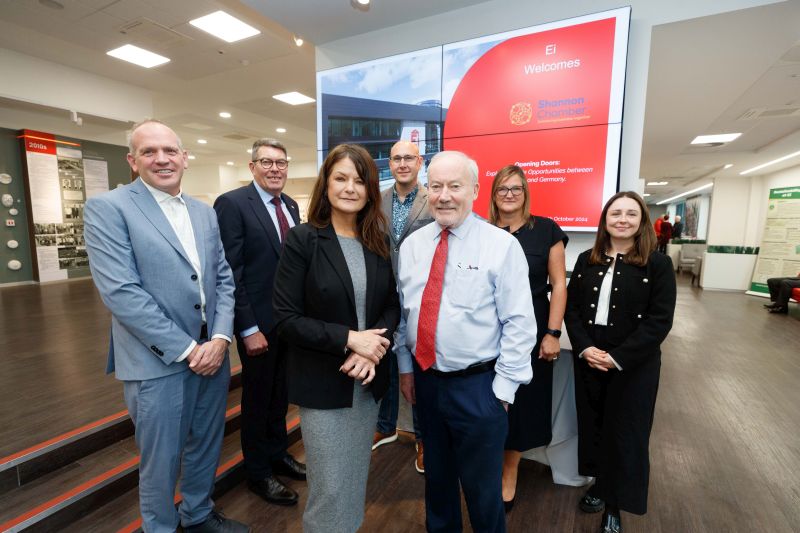
Trade opportunities between Ireland and Germany explored at Shannon Chamber event
Helen Downes, CEO, Shannon Chamber pictured at the German-Irish Chamber of Industry and Commerce event with Mick Guinee, chairman and chief executive, Ei Electronics and (back l-r): Patrick Bamming, head of tax and legal, German-Irish Chamber; Joe Walsh, director, Siemens Ltd; David Parkmann, head of DEInternational, market entry and sales of the German-Irish Chamber of Industry and Commerce; Sue Stringer, senior director global revenue recognition at Siemens Digital and; Josephine Murphy, solicitor, Ludwig Solicitors. Photograph by Eamon Ward
Companies attending a recent Shannon Chamber seminar held in Ei Electronics’ Centre of Excellence were encouraged to examine the opportunities that Germany offers them in terms of opening new markets or considering joint ventures. This advice was given by representatives from the German-Irish Chamber of Industry and Commerce who spoke at the event and by Mick Guinee, chairman and chief executive of Ei Electronics, who first entered the German market in 1996, and is now generating sales in the order of €100 million per annum in that market.
Advising attendees on the factors essential to success in the German market, Mick Guinee said: “Focus on quality, service and punctuality, appreciate the cultural and regional differences, have a direct presence in the market, participate in industry associations and trade shows, focus on communicating with customers, stick with the basics, but most of all, be prepared for unrelenting hard work.”
The scale of opportunity open to Irish companies was outlined by David Parkmann, head of DEInternational, market entry and sales of the German-Irish Chamber of Industry and Commerce.
Describing Germany as the heart of European excellence due to it being Europe’s largest economy with a strong focus of innovative future technologies, the third biggest exporter of goods worldwide, with high productivity, stable labour costs and advanced manufacturing processes, Mr Packman advised attendees not to look at the entire county due to its vastness but to focus on finding German partners in niche areas.
“Analyse potential market access and market potential, develop sound arguments for market entry, know your unique selling proposition for the German market and, once you have done this assessment, identity the decision makers on a prepared list of potential partners, and initiate meetings,” he advised.
Head of Tax and Legal at the German-Irish Chamber, Patrick Bamming, and Josephine Murphy, Solicitor, Ludwig Solicitors, also spoke at the event, giving attendees comparisons between the income tax, social security, corporate and trade taxes and VAT rates in Germany and Ireland, noting that each community has a trade tax, which is higher in the larger cities than in the regions.
Joe Walsh, Director of Siemens Ltd., the oldest German company in Ireland, enthralled the audience when recounting the company’s involvement in the construction of the Ardnacrusha power plant in the 1920s, which, he said, was a powerful demonstration of collaboration between Germany and Ireland.
With a continuing presence in the Shannon region, via Mentor, which is now a part of the Siemens PLM Software business unit, within the Siemens Digital Factory division, the company now delivers the most comprehensive digital design portfolio, from integrated circuit design to system design and the complete digital enterprise, Mr Walsh said the Siemens is committed to driving sustainable growth in Ireland.
Commenting on the value of an event of this nature, Shannon Chamber CEO Helen Downes said: “Our members are already deriving benefits from events we have held with Chambers of Commerce from other countries, particularly those operating in markets that offer potential to Irish companies. This year we have also linked with the Ireland Canada Business Association and will be looking to extend this reach in 2025.
“Key takeaways from this event were that the complexity of setting up a GMBH is a big challenge for Irish companies so they may need to look at other avenues for market entry. Also, Germans are quality orientated so getting accreditation is key to success. They are also price conscious, so companies need to be prepared for tough negotiations to seal a deal, but it’s a high potential market and worth investigating,” she added.
Further information on the German market is available from the German-Irish Chamber of Industry and Commerce www.german-irish.ie/en/business-services/deinternational
